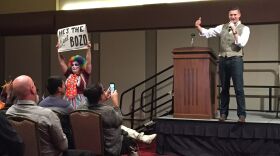Following the weekend violence from a white supremacist rally in Charlottesville, Va., there are renewed calls for North Texas cities to remove their Confederate monuments and for school districts to rename schools that honor Confederate leaders.
In Dallas, five city council members have signed a memo requesting that the issue be placed on an upcoming agenda. They want the council to pass a resolution that would remove Confederate monuments located on city property.
Council member Philip Kingston sent the memo last week before the violence in Charlottesville.
“The basic issue is this: They’re public celebrations of an ideology of white supremacy,” he said. “And they are being maintained using public funds and that is deeply unjust for those of us who don’t agree with white supremacy.”
Kingston says efforts to remove Confederate statues in other cities like Charlottesville and New Orleans have gotten people across the South to talk about what to do with their own monuments.
In Dallas, Kingston says a diverse coalition of community and city leaders is pushing for change.
“The community here – the clergy community and historians – have formed a partnership to really try to educate the public about why it’s important to remove them and then to work with political leaders to get it down,” Kingston said.
'How are we going to start to heal?'
On Tuesday, Dallas Mayor Mike Rawlings announced he wants to form a task force to discuss whether the city should remove its Confederate monuments.
Rawlings says he has also asked the Dallas Holocaust Museum and other groups about what to do with statues of Robert E. Lee, Jefferson Davis and other Confederate leaders located in various parts of Dallas.
“Look, this is simple,” Rawlings said. “We can just remove them. The question is, how are we going to start to heal on this issue? To do that we need to listen and talk to one another. And there’s a process to do that. So I am a big fan of moving quickly. But when we have a chance to learn from one another, I’ll take that moment.”
'Remember and memorialize'
The issue goes beyond City Hall. Dallas isn't the only Texas city where these conversations are happening. In San Antonio, a Confederate monument was at the center of protests over the weekend.
Confederate supporters, like Paul Gramling, say these monuments are war memorials and symbols of heritage. Gramling is a commander with the Son's of Confederate Veterans.
"They were put in spots where they are to remember and memorialize the dead soldiers, our dead men, who didn't come off the battlefield, who never made it home," Gramling said.
Others say Confederate monuments should be removed but not destroyed. They say placing them in museums is one alternative, so people don't forget a part of history.
'It's past time'
The debate over what to do about connections with the Confederacy goes beyond cities.
Over the weekend, Dallas school board trustee Miguel Solis said on Twitter it was time to change the names of district schools named after Confederate leaders.
It's past time to change the name of all confederate schools in @dallasschools. Looking for leaders to join me in making the change.
— Miguel Solis (@MiguelForDallas) August 14, 2017
Solis says district leaders have talked about the issue in the past, but haven’t taken action. On Tuesday, the Dallas school board president wrote on Facebook that trustees will discuss on Sept. 14 whether to rename schools.
“I think as leaders we really need to ask ourselves what message are we sending to our children when we allow things like monuments and names of schools to continue to exist,” Solis said. “What signal am I sending to a child when I force him to walk into a school every day that harkens back to some of the darkest times in American history?”
Solis points to what happened at one Dallas middle school as an example of letting the community have a voice in these decisions.
Hood Middle School was named after a Confederate general. Students were concerned. Last year, the school held an election to change the name.
Soon after, Solis and his colleagues on the school board approved dropping the Confederate name. The school’s now called Piedmont G.L.O.B.A.L Academy.
Solis, a former history teacher, says what happened in Virginia can become teaching moments for students and leaders.
“As adults, we really have to ask ourselves when these issues arise the way they just did in Virginia, 'What are we going to do to teach a lesson to our kids about the better component of American values?'” he said. “It calls for action.”
Solis says his tweet does just that – it calls on his school board and others to address the South’s dark past.
Texas Public Radio reporter Joey Palacios and KERA's Bill Zeeble contributed to this story.




